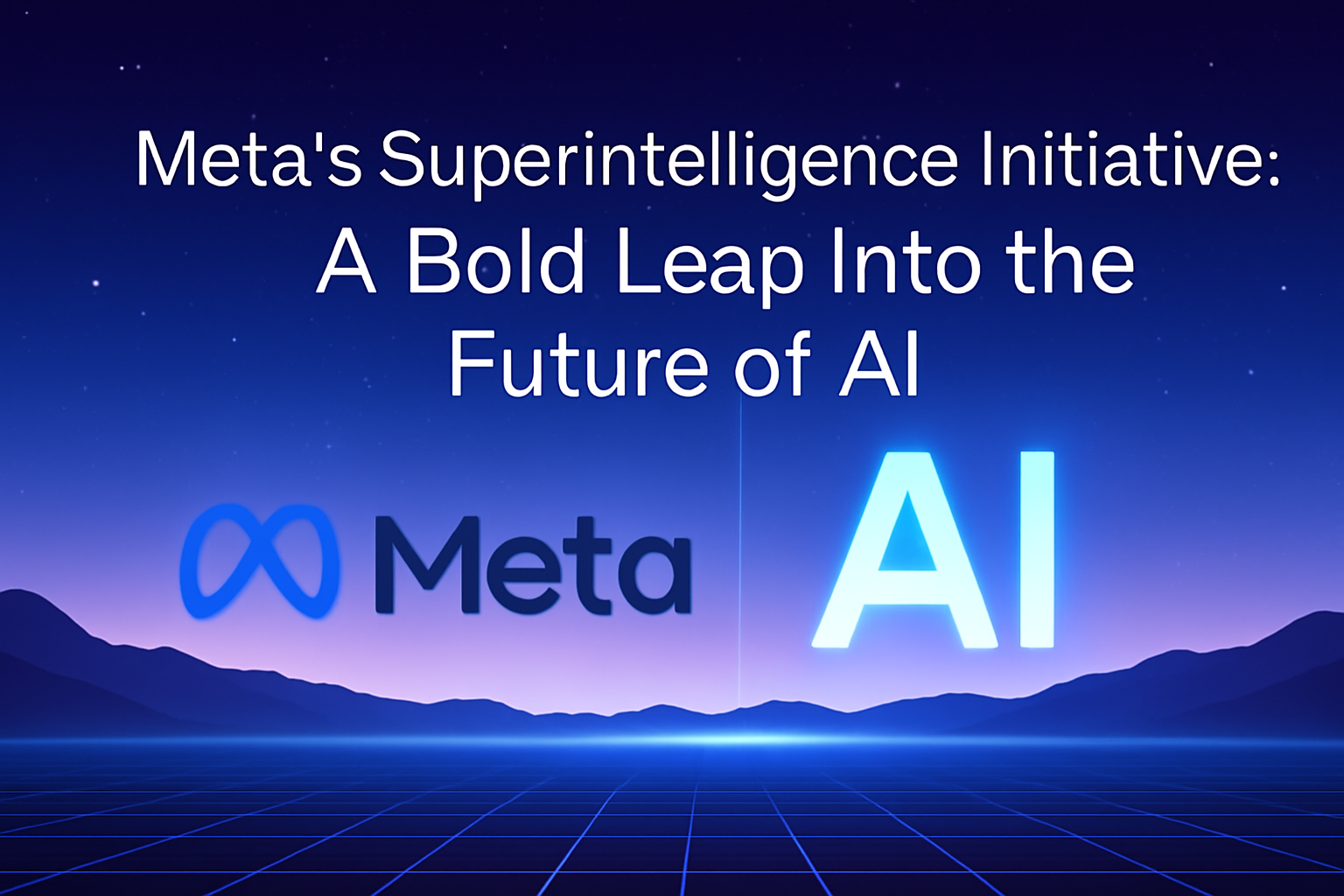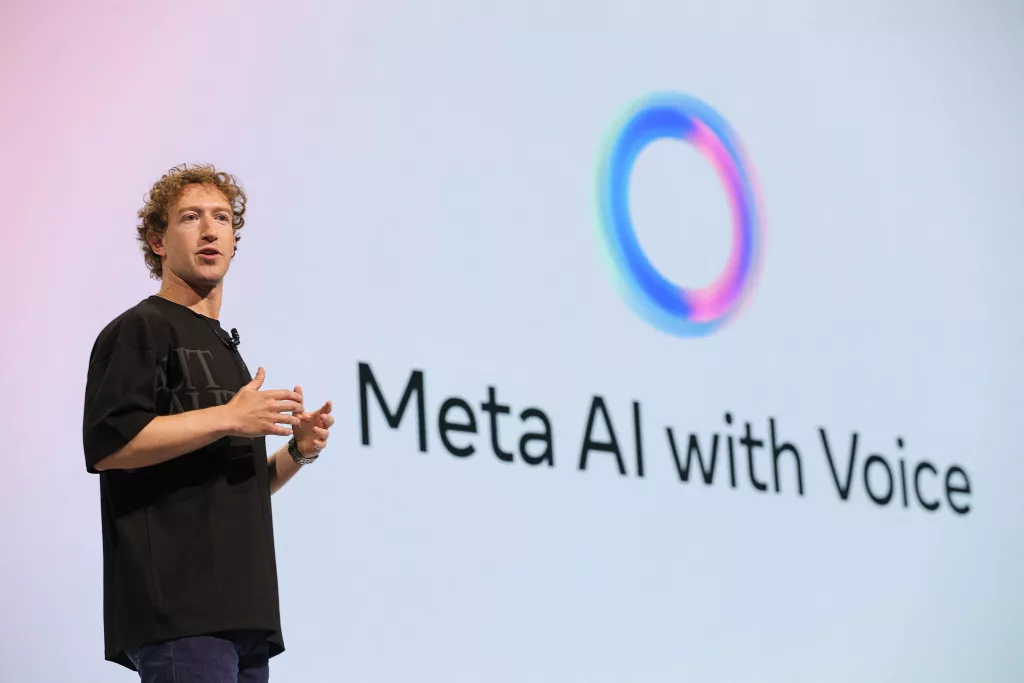In the rapidly advancing world of artificial intelligence (AI), few companies are making as bold a move as Meta Platforms. Under Mark Zuckerberg’s leadership, Meta has unveiled an ambitious project: Meta Superintelligence Labs (MSL). With billions of dollars invested, and a hiring spree targeting the brightest minds in AI, Meta is setting itself up to lead the AI revolution. But what exactly does this mean for the future of technology? How will this initiative shape AI development? In this blog, we will explore Meta’s game-changing plans, the key players behind the project, and the potential ramifications for AI and beyond. Mark Zuckerberg is betting Meta’s future on developing “personal superintelligence for everyone.” This vision aims to: Create AI systems that outperform humans in cognitive tasks. Transform industries such as healthcare, education, and beyond. Push toward AI that exceeds human capabilities across various functions. Meta CEO Mark Zuckerberg presents Meta AI with Voice, as he makes a keynote speech during the Meta Connect annual event, at the company’s headquarters in Menlo Park, California, U.S. September 25, 2024. REUTERS/Manuel Orbegozo To make this vision a reality, Meta is heavily investing in building AI-optimized data centers. Specifically, the company plans to spend $64 billion to $72 billion in 2025, up from $28 billion in 2023. While these projections reflect the scale of Meta’s ambition, the figures are subject to change as the plans unfold. Moreover, by consolidating teams like FAIR and Llama model development under MSL, Meta is positioning itself to lead AI innovation. Ultimately, this initiative aims to redefine how AI interacts with society and transforms industries. Thus, Meta is not just improving AI; it’s creating a new frontier. In order to fuel this ambitious initiative, Meta is aggressively recruiting top AI talent. By offering up to $100 million in signing bonuses, Meta is setting a new standard for hiring in AI. This unprecedented hiring strategy includes: Trapit Bansal – Known for pioneering reinforcement learning at OpenAI, Bansal will now lead key AI projects at Meta. Shuchao Bi – Co-creator of GPT-4o’s voice mode and O4-mini at OpenAI, Bi will drive multimodal AI innovation at Meta. Ji Lin – Contributed to the development of GPT-4, GPT-4.1, and GPT-4o-imagegen; Lin now brings expertise in large language models (LLMs) to Meta. Hongyu Ren – Former OpenAI leader, contributed to GPT-4o and other Llama models, now focused on Meta’s AI research. Jiahui Yu – Co-creator of GPT-4o and GPT-4.1, Yu will further strengthen Meta’s capabilities in multimodal AI. Shengjia Zhao – Co-creator of ChatGPT and GPT-4, Zhao’s contributions to synthetic data will enhance Meta’s superintelligent systems. Huiwen Chang – Former Google Research expert, helped develop GPT-4o’s image generation and text-to-image architectures. Johan Schalkwyk – Former Google Fellow, led projects like Sesame and Maya, bringing his deep technical expertise to Meta. Pei Sun – Expert in AI for autonomous systems, Sun previously worked on Waymo’s perception models and now contributes to Meta’s AI innovations. Jack Rae – Worked at DeepMind on Gemini and Gopher models, Rae will lead Meta’s efforts to develop next-generation language models. Nat Friedman – Former GitHub CEO and AI investor, now co-leading MSL, focusing on AI product development and applied research. Joel Pobar – Former Anthropic researcher, specializing in inference and machine learning systems. Alexandr Wang – CEO of Scale AI, now Meta’s Chief AI Officer, leading MSL. Wang brings vast experience in AI model development and will oversee the strategy for Meta’s AI efforts. These remarkable hires underscore Meta’s commitment to building a world-class AI team capable of driving innovation forward. Therefore, the company is positioning itself to stay ahead of the curve in AI development. Despite its bold vision, Meta faces significant challenges. For instance, its Llama 4 model has faced criticism for underperforming relative to industry standards. In addition, Meta has been accused of inflating benchmark results, making Llama 4 seem more competitive than it actually is. Moreover, the Llama 4 Behemoth, Meta’s largest AI model, has faced multiple delays, further raising doubts about the company’s ability to deliver on its promises. At the same time, Meta is facing fierce competition from AI giants like OpenAI, Google, and DeepMind. These companies have already developed AI models that include advanced reasoning capabilities. Furthermore, Meta has experienced the loss of key Llama researchers to rival companies, compounding the pressure to recruit and retain top talent. Nevertheless, despite these obstacles, Meta remains determined. To tackle these setbacks, Meta is doubling down on its investments and forming MSL to drive innovation. By doing so, the company hopes to not only catch up but eventually surpass its rivals. Reactions from the tech community have been mixed, with some expressing optimism and others remaining cautious. Here’s a summary of the key opinions: Many experts view Meta’s massive investment in AI and its ability to recruit top-tier talent as signs that the company could reshape the future of AI. The company’s strategy to bring together some of the brightest minds in the field suggests Meta could push the boundaries of what AI is capable of. Furthermore, the resources Meta is committing — from $64 billion to $72 billion in AI infrastructure — suggest that the company is serious about maintaining a competitive edge and building next-generation AI models. However, some experts remain skeptical about the long-term sustainability of this strategy. One primary concern is the potential for internal conflict. With many of Meta’s recruits coming from rival companies like OpenAI and Google, there are worries that egos could clash. The influx of highly-paid talent, many of whom have strong individual track records, could create a fragmented environment where collaboration suffers. As a result, some question whether Meta can harness the full potential of these experts to drive collective innovation. Beyond competition and internal dynamics, Meta’s history with data privacy issues casts a long shadow over its ambitions to manage superintelligent AI responsibly. While the company has demonstrated technical expertise, critics argue that its track record of data misuse and privacy violations raises significant doubts about whether Meta can be trusted with superintelligent systems. Many believe Meta must first resolve these ethical concerns before it can lead the charge in AI development. Without addressing public and regulatory concerns, some fear the company could exacerbate the very risks AI is meant to address. Meta’s pursuit of superintelligence has profound implications for the future of AI and technology. If successful, it could: Transform industries: In healthcare, AI could diagnose and treat diseases faster and more accurately than human doctors. Create ethical dilemmas: Superintelligent AI could create a power imbalance between those who control the technology and the public. Increase the need for regulation: As AI systems become more powerful, regulations will be necessary to address issues such as privacy, security, and ethical governance. Meta’s focus on superintelligence will have a significant impact on AI professionals. As the company invests billions and assembles an elite team, it signals a shift in the AI career landscape. Here’s what this means for those in the AI industry: New opportunities: Meta’s recruitment efforts suggest a surge in demand for AI professionals, particularly in machine learning, deep learning, and natural language processing. These professionals will find ample opportunities at Meta and throughout the AI industry. Increased specialization: As Meta pushes for superintelligence, AI experts will need to specialize in areas like reinforcement learning, LLMs, and multimodal AI. Lifelong learning will be essential to remain competitive. New roles: Meta’s superintelligent systems will create new positions such as AI model architects, ethical AI specialists, and AI safety engineers—roles that will be critical in ensuring the technology’s responsible development. Increased competition: The influx of top talent could lead to a more competitive work environment at Meta. Collaboration might suffer if egos clash, creating tension within the team. Ethical challenges: As AI becomes more integrated into daily life, professionals will need to address the ethical implications of their work, ensuring that the technology benefits society. Meta’s Superintelligence initiative represents a career-defining moment for AI professionals. It offers exciting opportunities but also presents complex challenges. As the AI landscape changes, professionals must adapt, stay ahead, and ensure that technology advances in a responsible and ethical manner. Meta’s decision to invest heavily in AI and launch Meta Superintelligence Labs represents a critical moment in the company’s history. By recruiting top AI talent and committing to large-scale infrastructure, Meta is positioning itself to lead AI development. Nevertheless, the road ahead will be challenging. Meta faces internal struggles with its current models, mounting competition, and skepticism. Still, with its massive investment, strategic hires, and unwavering vision, Meta is positioning itself to make a lasting impact on the AI landscape. Looking ahead, Meta’s Superintelligence initiative will likely become a central topic in the ongoing debate over AI’s potential and its ethical implications. Whether Meta succeeds or falters, one thing is clear: this is only the beginning of a new AI era, and Meta is determined to be at the forefront of it.Meta’s Big Vision: Superintelligence for Everyone
The Talent Frenzy: Meta’s Unprecedented AI Hiring Strategy
Former OpenAI Experts:
Google Experts:
DeepMind Experts:
GitHub and Microsoft Experts:
Anthropic Experts:
Scale AI Expert:
Meta’s Struggles and Opportunities: A Competitive Landscape
Reactions from the Tech Community: Is Meta’s AI Strategy Sustainable?
Support:
Skepticism:
Ethical Concerns:
What Does Meta’s AI Vision Mean for the Future?
Impact on Careers: Opportunities and Challenges
Meta’s Bold Gamble on AI’s Future
Meta’s Superintelligence Initiative: A Bold Leap Into the Future of AI
AWS, Azure, and GCP Certifications are consistently among the top-paying IT certifications in the world, considering that most companies have now shifted to the cloud. Earn over $150,000 per year with an AWS, Azure, or GCP certification!
Follow us on LinkedIn, YouTube, Facebook, or join our Slack study group. More importantly, answer as many practice exams as you can to help increase your chances of passing your certification exams on your first try!
View Our AWS, Azure, and GCP Exam Reviewers Check out our FREE coursesOur Community
~98%
passing rate
Around 95-98% of our students pass the AWS Certification exams after training with our courses.
200k+
students
Over 200k enrollees choose Tutorials Dojo in preparing for their AWS Certification exams.
~4.8
ratings
Our courses are highly rated by our enrollees from all over the world.






















